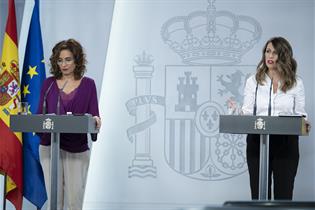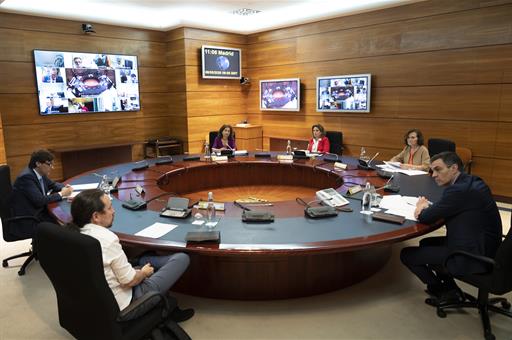Coronavirus COVID-19. Extraordinary Council of Ministers
Government extends state of emergency until 24 May and agrees on de-escalation procedure
Council of Ministers - 2020.5.8
Moncloa Palace, Madrid
The Council of Ministers approved the extension of the state of emergency until midnight on 24 May, after receiving the regulatory authorisation of the Lower House of Parliament.
The Minister for the Treasury and Government Spokesperson, María Jesús Montero, specified that this extension includes stepping up co-governance with the regional governments to develop the Transition Plan towards a New Normality. The de-escalation phases will be activated depending on health, epidemiological, social, economic and mobility indicators. The start of each phase will be decided by the Minister for Health in coordination with the regional governments, whose presidents will also be responsible for their implementation in their respective regions.
María Jesús Montero argued that it is essential to maintain the state of emergency to protect public health, progress in containing the virus and carry out a progressive de-escalation. To do that, she called for responsibility in continuing to respect social distancing and recommendations on personal protection and hygiene. "This individual commitment is what will really help us to win collectively, to halt the virus and to gradually recover activities and our daily lives".
Social pact to extend ERTEs stemming from coronavirus
 Pool Moncloa/J.M.CuadradoThe Minister for Work and Social Economy, Yolanda Díaz, referred to the agreement reached between Central Government and the social stakeholders to extend the temporary lay-off plans (ERTEs) due to force majeure until 30 June and maintain unemployment protection and the exemption from making National Insurance contributions.
Pool Moncloa/J.M.CuadradoThe Minister for Work and Social Economy, Yolanda Díaz, referred to the agreement reached between Central Government and the social stakeholders to extend the temporary lay-off plans (ERTEs) due to force majeure until 30 June and maintain unemployment protection and the exemption from making National Insurance contributions.
Yolanda Díaz claimed that the document provides collective cover for large and small companies, the self-employed, workers and the economy of the country at a very delicate time. It also means that "no-one is left behind".
She also pointed out that the pact is good for business owners and workers and responds to the commitment from the representatives of the employers' organisations and trade unions to their country. "They put their differences to one side in favour of the legitimate defence of their interests to forge an agreement and try and save our country from a crisis that is both economic and social in nature".
The minister stressed that the agreement is balanced because it fairly weighs up the protection of workers against their gradual return to their economic and labour activities, and takes into account those sectors that are in a more delicate situation.
Yolanda Díaz also announced the creation of a tripartite committee, which will meet on the second Wednesday of each month, to define the sectors that will need assistance after the state of emergency is lifted. "We will examine this sector-by-sector and carefully look at what assistance they require", she said.
Furthermore, the minister recalled that the Ministry of Work was created 100 years ago this Friday. In her opinion, the agreement reached on Friday is the best tribute that can be paid to commemorate this anniversary.
To that end, the Government Spokesperson praised the capacity for resistance and adaptation to the new challenges of business owners and workers, and thanked the trade unions and employers' organisations for their commitment, "which has once again confirmed that the social stakeholders are a fundamental and essential element in the socio-economic development of Spain".
Positive balance of labour and economic measures
 Pool Moncloa/J.M.CuadradoMaría Jesús Montero described, in view of the recent figures, the measures implemented to date as "effective" in protecting independent contractors, SMEs and companies.
Pool Moncloa/J.M.CuadradoMaría Jesús Montero described, in view of the recent figures, the measures implemented to date as "effective" in protecting independent contractors, SMEs and companies.
Specifically, 442,000 independent contractors and SMEs have signed up to the option of deferring the payment of taxes to the tune of 30,000 euros for six months, without paying interest on the first three months. "To date, 2.44 billion euros have been deferred", specified the minister. According to the Bank of Spain survey mentioned by the Government Spokesperson, companies consider that the option of deferring their tax obligations has been one of the most useful measures taken in the current situation.
1.2 million independent contractors have been granted the extraordinary benefit for the cessation of activity, and the Official Credit Institute (Spanish acronym: ICO) guarantees for lines of credit have injected 40 billion euros of liquidity into the economy. In turn, the facility to apply the force majeure test has benefitted more than 3 million workers.
Cooperation and unity in Spain and Europe
 Pool Moncloa/Borja Puig de la BellacasaMaría Jesús Montero insisted that all of society and all institutions must play their part in making contributions and "laying sound foundations that lead to a fair recovery", once the health crisis is over. "Our people expect all public servants to set reproaches and ideological differences to one side and focus on what unites us, work together and bring the country out on top from an extremely serious situation", she said.
Pool Moncloa/Borja Puig de la BellacasaMaría Jesús Montero insisted that all of society and all institutions must play their part in making contributions and "laying sound foundations that lead to a fair recovery", once the health crisis is over. "Our people expect all public servants to set reproaches and ideological differences to one side and focus on what unites us, work together and bring the country out on top from an extremely serious situation", she said.
María Jesús Montero reached out to all political forces and expressed her confidence in the ability of the parliamentary Committee for the social and economic reconstruction of our country, officially constituted in the Lower House on Thursday, to start to "soon make proposals about how to proceed now and, above all, in the future". The Government Spokesperson also highlighted the crucial role of regional governments, local authorities, trade unions and business leaders, "whose commitment we do not doubt".
As regards the European Union, María Jesús Montero explained that Friday's meeting of the Eurogroup will address some of the measures proposed by Spain, such as the Reconstruction Fund agreed on 23 April, and the creation of a "triple safety net", based on an unemployment scheme with a provision of 100 billion euros, the mobilisation of 200 billion euros by the European Investment Bank to support the productive fabric and the establishment of lines of liquidity under the European Stability Mechanism for those countries that need to draw on them.
The minister claimed that the Government of Spain expects all regional governments, through unity, cooperation and solidarity, "to offer a resounding response to the worst health emergency in more than a century".
Non official translation





